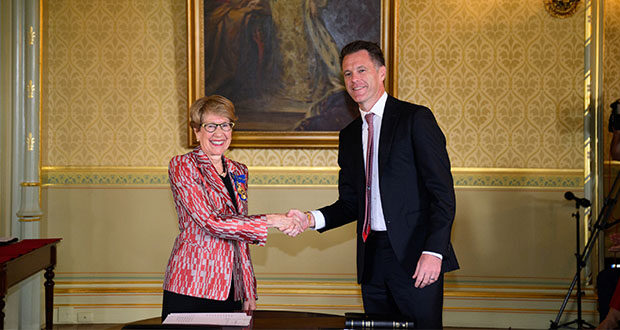Under a newly-elected Labor government, NSW public schools should expect more funding, a blanket mobile phone ban and an intensive state-wide tutoring program to address falling academic standards.
Chris Minns was sworn in as the state's 47th Premier this week after Labor achieved an early win against the 12-year Coalition government.
Education was a key issue used in Minns election campaign, which included a promise to establish a $400m education fund to inject more resources into state schools.
Labor said the four-year commitment would help NSW public schools reach 95 per cent of its schooling resource standard by 2025.
According to a McKell Institute analysis, public school students receive about 92 per cent under the current arrangement - slightly higher than the 90 per cent national average.
Labor has said it would fund a shortfall to reach 100 per cent of its SRS benchmark if negotiations with the Commonwealth fall through at the end of 2024.
New tutoring program
Under its education fund, Labor pledged to establish an intensive literacy and numeracy program to help lift declining student outcomes across the state.
The program, set to begin in early July, will operate in primary and high schools but will have an initial focus on this year's Year 10 cohort.
A recent Grattan Institute report called for a national, free tuition program to help close the learning gap between advantaged and disadvantaged students.
The analysis, which took data from the 2022 NAPLAN results, showed the learning gap between the most and least advantaged students had more than doubled in reading and numeracy between Year 3 and Year 9.
“This government has had 12 years to turn education around in this state and they’ve failed,” Chris Minns said in January.
“Under Labor, schools will be fully funded, we’ll have more teachers in classrooms, kids off their devices and focusing on their learning.”
More teachers
Labor’s education fund would also be used to offer 10,000 temporary teachers permanent roles in a bid to stem teacher attrition rates.
The number of potential retirees in Australian schools is expected to grow to over 4,000 in secondary schools and over 2,000 in primary schools by the end of next year.
In 2011, there were 11,695 full-time equivalent temporary teaching positions in NSW.
This grew to 21,366 by 2021.
Labor has also pledged to cut administration hours for teachers by five hours per week.
Potential wage rises
One of Labor’s core election promises was to scrap the Coalition's public service wages cap, allowing public sector teachers to negotiate for higher wages.
Minns said during the campaign’s final week that public sector workers would be paid above the Coalition’s existing cap of 3.5 per cent.
A recent University of Sydney report, published in January, found due to cost-of-living pressures educators were among the worst-paid professions in NSW.
The report argued that teachers’ wages should increase by between 15.5 per cent and 25.5 per cent within the next seven years.
On Sunday, the new Premier said he'll begin discussions with unions over new workplace agreements "soon".
President of the NSW Teachers Federation Angelo Gavrielatos said the union will be seeking immediate negotiations "as soon as the government is sworn in."
“While the outcome of some seats is not yet final, the clear defeat of the Perrottet Government puts an end to deliberate neglect and denial which has left our schools and TAFE in a state of crisis,” Gavrielatos said.
“Federation is ready to work with the incoming Minns Government to urgently address the unsustainable workloads and uncompetitive salaries of teachers.”
Phone ban
Public high schools in NSW will also be hit with a blanket mobile phone ban by the end of the 2023 school year.
Chris Minns announced the policy after state Labor pledged $2.5 million to research the impact of screen addiction on young people.
Newly-elected deputy premier and Labor education spokesperson Prue Car said school communities would be consulted before a ban is put in place.
“Our mobile phone ban in high schools is just one tenant of the way that Labor will start to address the issue of excessive online use, cyberbullying, education standards, and of course the critical issue of mental health and wellbeing,” Car said in January.
Mobile phones are currently banned across all public primary schools in NSW, and some independent and Catholic secondary schools.
Some experts have questioned the efficacy of a ban, citing a lack of sufficient evidence to support that banning phones supports teenagers' well-being.
Do you have an idea for a story?Email [email protected]
 Education Review The latest in education news
Education Review The latest in education news
